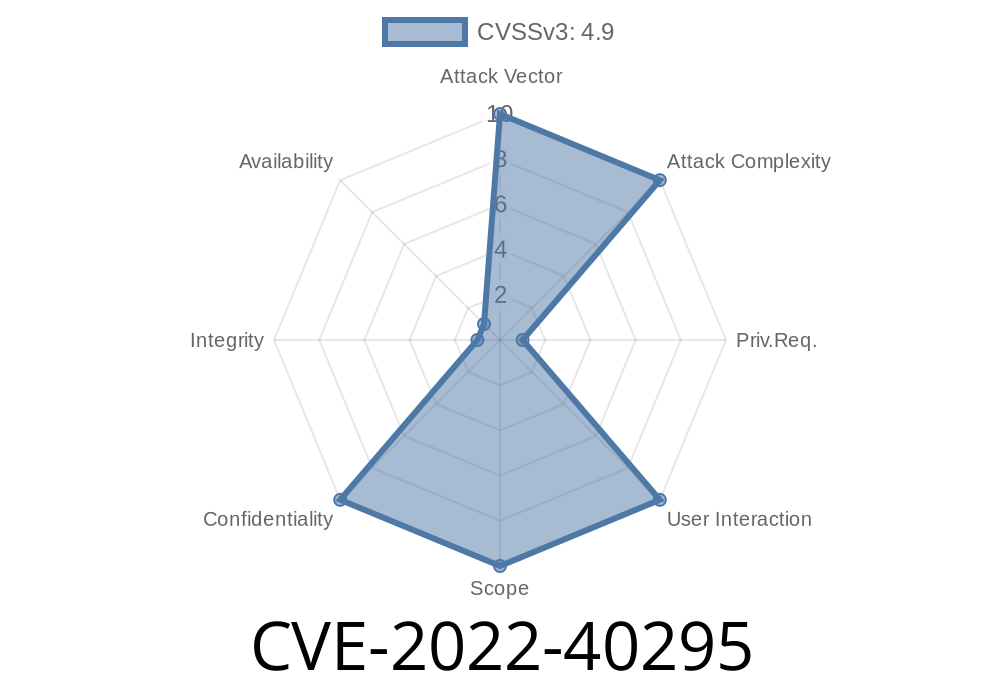When we talk about serious security risks, a classic example is an application that lets even trusted users—like administrators—see sensitive data that should never be visible in plain text. CVE-2022-40295 is one such vulnerability: it allowed authenticated information disclosure where admin users could view unsalted, readable user passwords. Here’s what happened, how the exploit works, and why it’s a big deal, explained in straightforward language.
What is CVE-2022-40295?
CVE-2022-40295 is a security flaw found in certain web applications (details in references below) where the backend stores and displays user passwords in plain text, without any kind of hashing or salting. If you’re an administrator for the app, the management dashboard would literally show you user passwords exactly as they were typed during signup.
This means if a hacker gets a hold of your admin credentials (or uses social engineering to fool someone who has them), they can view every user’s password. Since the passwords are not protected with salts or hashes, attackers can easily grab the user database, and use those credentials anywhere else the victim uses the same password.
Vulnerable Way (What Happened)
// BAD EXAMPLE: No hashing, no salting
$username = $_POST['username'];
$password = $_POST['password'];
$query = "INSERT INTO users (username, password) VALUES ('$username', '$password')";
mysqli_query($db, $query);
How the Admin Dashboard Displays It
// Vulnerable admin page shows ALL user passwords in clear text
$result = mysqli_query($db, "SELECT username, password FROM users");
while ($row = mysqli_fetch_assoc($result)) {
echo "User: " . $row['username'] . " | Password: " . $row['password'] . "
";
}
Here, anyone logged in as an administrator can see all user credentials as plain text.
Login as Admin:
A malicious actor gains a bona fide admin account—maybe via phishing, or weak admin credentials.
View All Passwords:
With access to the sensitive admin page, the attacker views all user passwords in the system, as shown above.
Offline Password Attacks:
Because the passwords are unsalted, these values can be fed into password-cracking tools. Even if the passwords were somehow encoded (with base64, for example), without a unique salt per user or a secure hash, they're *easy* to reverse.
Credential Stuffing:
Attackers will check if those passwords work on Gmail, Facebook, bank accounts, or company VPNs. If users reused passwords—which many do—the damage expands well beyond the original app.
Why is Unsalted Worse?
A salt is random data added to passwords before hashing. Without salts, two users with the same password have identical hashes—making it easy for attackers to crack many accounts at once using "rainbow tables." With plain text, you don’t even need to crack anything.
Here’s how the fixed code should look
// SECURE EXAMPLE: Hash and salt passwords before storing
$username = $_POST['username'];
$password = $_POST['password'];
$hashed_password = password_hash($password, PASSWORD_BCRYPT);
$query = "INSERT INTO users (username, password) VALUES ('$username', '$hashed_password')";
mysqli_query($db, $query);
You should NEVER print stored password values anywhere.
Audit Administrative Panels:
Ensure that admin pages never expose sensitive user data like passwords. Always stick to best practices: show only non-sensitive information.
Force All Users to Reset Passwords:
If your app was vulnerable, make everyone reset their passwords immediately, and consider informing users that their credentials may have been exposed.
References and Further Reading
- NVD Entry for CVE-2022-40295
- OWASP Password Storage Cheat Sheet
- Why You Need to Salt Passwords
- PHP password_hash() documentation
Conclusion
CVE-2022-40295 shows how a simple design mistake—saving unsalted, plain-text passwords, and letting them be seen by admins—can threaten every user. Always hash and salt your passwords, never store them in plain text, and make sure sensitive info is not visible in your admin area. If you maintain or design web applications, reviewing how you handle password storage could save your users (and reputation) from disaster.
Timeline
Published on: 10/31/2022 21:15:00 UTC
Last modified on: 11/03/2022 02:38:00 UTC
